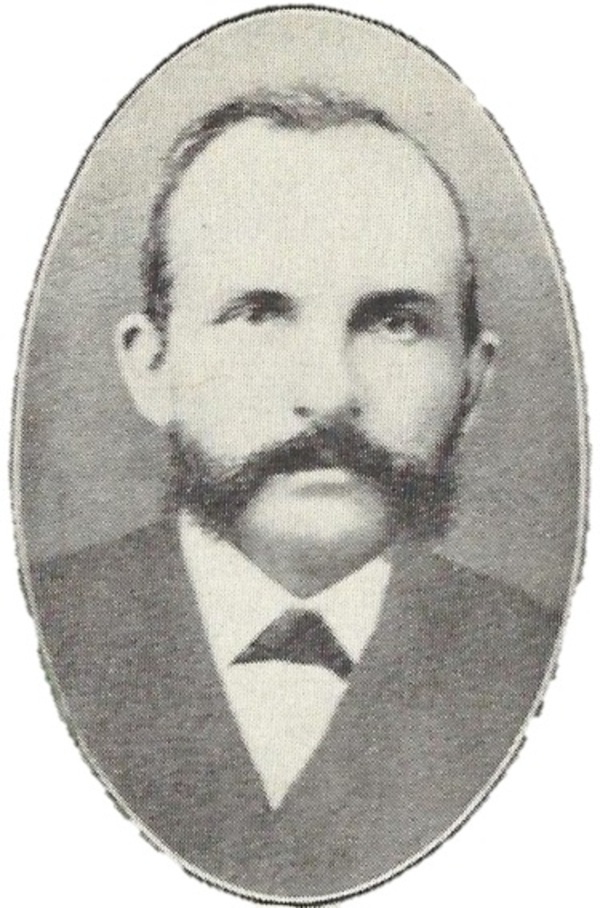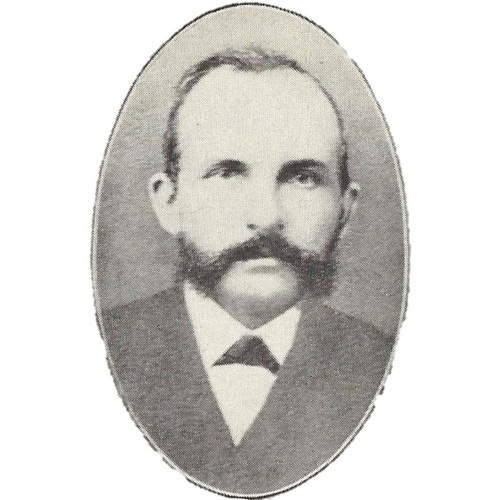
Source: Link
MOTZ, JOHN (baptized Johannes), tailor, newspaperman, politician, and office holder; b. 5 June 1830 in Diedorf (near Wanfried, Germany), son of Johannes Motz clerk of Diedorf, and Margaretha Schroeter; m. 17 Feb. 1868 Helena Vogt in Berlin (Kitchener), Ont., and they had three daughters, one of whom was adopted, and two sons; d. there 29 Oct. 1911.
In 1846 John Motz’s sister, Regina, and her husband, Friedrich Noll, immigrated to Upper Canada. Knowing his elder brother would inherit the family property in Saxe-Coburg-Gotha, Motz decided to join them. The 18-year-old arrived in Quebec City in June 1848 and travelled on to Berlin, where the Nolls had settled. He initially worked as a farm-hand and a shingle cutter. In 1850 he apprenticed himself to Christian Nahrgang, a tailor; he subsequently established his own tailoring business in Petersburg and St Jacobs.
Within a few years the lure of the west seized Motz’s imagination. In 1857 he worked in Rock Island, Ill., and Davenport, Iowa. The following year, however, he returned to Berlin. He attended the local grammar school, where he mastered English.
Motz’s plan to become a teacher was abandoned when he established a friendship and business relationship with Friedrich Rittinger, printing manager of the Deutsche Canadier and the Telegraph in Berlin. In 1859 they founded what would become the largest and most important German-language newspaper in Ontario, the Berliner Journal. Motz acted as writer, editor, and business manager; Rittinger was the printer and technical manager. By 1867, of all Germans in Canada, 60 per cent lived in Waterloo County. In close touch with this German Canadian community, Motz provided thorough coverage of its news and activities and presented views that reflected the attitudes of his subscribers. As a result, the paper succeeded while those of many competitors, including non-German journals, failed. By 1896 the firm of Rittinger and Motz held approximately $100,000 in property. Throughout his career in journalism Motz was active in the German Canadian Press Association – he became its president in 1872 – and the Canadian Press Association. Beyond his newspaper, Motz sat on the boards of several businesses, including, during the early 1880s, the Economical Mutual Fire Insurance Company.
As editor of the Berliner Journal Motz wrote about and encouraged the growth and prosperity of Waterloo County. His community commitment can also be seen in his political activities. In 1870 he was first elected to the Berlin Town Council; he later served as deputy reeve and, in 1880–81, mayor. He was appointed sheriff of Waterloo County in 1890, a position he would hold until his death. On the national level, he was active in the Reform party for many years, serving as vice-president and president of the Reform Association of North Waterloo. During the late 1890s and early 1900s he exchanged cordial letters with Prime Minister Sir Wilfrid Laurier, many on patronage matters.
Motz’s interest in community affairs extended well beyond politics. He was a member of both the Concordia Club, which was devoted to the cultivation of German tradition through language, custom, and song, and the Horticultural Society. While on the high school board and the separate school board (1881), and through his newspaper, he promoted German-English bilingualism in the schools of Waterloo; he had strenuously opposed attempts by county school officials in the 1860s and 1870s to abolish German-language education. In 1889 he was appointed chairman of the board of management of the Berlin Free Library. As well, he participated in the organization of the local Children’s Aid Society. Motz approached spiritual affairs with equal vigour. A member of St Mary’s parish, he belonged to the Catholic Mutual Benefit Association and was the founder and, until 1911, president of the St Boniface Sick Society.
John Motz retired as editor of the Berliner Journal in 1899, and the business was continued by the founders’ sons, William John Motz and John Adam Rittinger. Motz’s 40-year newspaper career, however, was only one facet of this public-spirited man who, the Daily Telegraph recorded at his death, “possessed the respect and esteem of his fellow citizens in the highest degree.” He was a hard-headed businessman and a community activist. This combination ensured that the German Canadians of Waterloo had a spokesman whose voice was heard at home and in Ottawa.
A devoted family man, Motz died at the age of 81 in 1911. As a tribute to his accomplishments, he was inducted into the Waterloo County Hall of Fame in 1975.
A more extensive study of John Motz and the newspaper he founded is provided in the author’s thesis, “A facile pen: John Motz and the Berliner Journal, 1859–1911” (ma thesis, Univ. of Waterloo, Ont., 1991).
AO, RG 22-214, no.5608; RG 80-27-2, 76: 47. Kitchener-Waterloo Record, Library (Kitchener, Ont.), Hist. files. Univ. of Waterloo Library, Doris Lewis Rare Book Room, Paul Motz coll., Motz family papers, esp. “Chronicle from the local area of the Diedorf municipality, district of Muehlhaufen, administrative district of Erfurt, realm of Prussia (Prussian Kingdom), drafted by the regional mayor, Johannes Mom in the year 1844,” trans. Sonja Kroisenbrunner. Berliner Journal (Berlin, later Kitchener), 29 Dec. 1859–1918 (name changed to Ontario Journal on 10 Jan. 1917). Daily Telegraph (Berlin), 31 Oct. 1911. Kitchener-Waterloo Record, 31 Dec. 1947–1991, esp. Ernie Ronnenberg, “John Motz: pioneer country newspaperman, public servant,” 8 July 1975. News-Record (Berlin), 31 Oct.-1 Nov. 1911. W. H. Breithaupt, “President’s address: some German settlers of Waterloo County,” Waterloo Hist. Soc., Annual report (Berlin), 1 (1913): 11–15. Dorothy Grigg and B. M. Dunham, “The Kitchener Public Library,” Waterloo Hist. Soc., Annual report (Toronto), 16 (1928): 71. H. K. Kalbfleisch, The history of the pioneer German language press of Ontario, 1835–1918 (Toronto, 1968). K. H. Lamb, “The sheriffs of Waterloo,” Waterloo Hist. Soc., [Annual report] (Kitchener), 72 (1984): 119–27. Gottlieb Leibbrandt, Little paradise: the saga of the German Canadians of Waterloo County, Ontario, 1800–1975 (Kitchener, 1980). The mercantile agency. reference book . . . (Montreal), September 1896. A. O. Potter, Let’s reminisce (Kitchener, 1954). Recollections of 125 years, [ed. Wendy Collishaw and Barry Preston] (Kitchener, 1979). W. V. Uttley, A history of Kitchener; Ontario (Kitchener, 1937; repr. [Waterloo, 1975]).
Cite This Article
Lynn E. Richardson, “MOTZ, JOHN (baptized Johannes),” in Dictionary of Canadian Biography, vol. 14, University of Toronto/Université Laval, 2003–, accessed March 2, 2026, https://www.biographi.ca/en/bio/motz_john_14E.html.
The citation above shows the format for footnotes and endnotes according to the Chicago manual of style (16th edition). Information to be used in other citation formats:
| Permalink: | https://www.biographi.ca/en/bio/motz_john_14E.html |
| Author of Article: | Lynn E. Richardson |
| Title of Article: | MOTZ, JOHN (baptized Johannes) |
| Publication Name: | Dictionary of Canadian Biography, vol. 14 |
| Publisher: | University of Toronto/Université Laval |
| Year of publication: | 1998 |
| Year of revision: | 1998 |
| Access Date: | March 2, 2026 |



